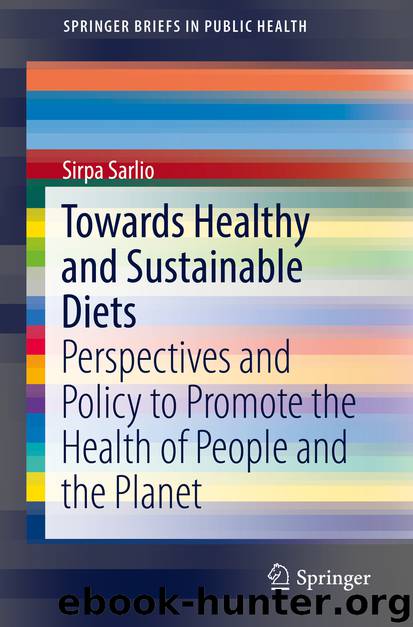Towards Healthy and Sustainable Diets by Sirpa Sarlio

Author:Sirpa Sarlio
Language: eng
Format: epub
Publisher: Springer International Publishing, Cham
3.1.2 Studies on Healthy and Sustainable Diet
Research on healthy and sustainable diets has increased rapidly over the last few decades but the scope of the studies carried out remains limited. Such studies should ideally evaluate all the dimensions of a sustainable and healthy diet such as nutritional quality and health, environmental impact including the optimal use of natural resources and biodiversity, cultural acceptability, affordability, accessibility, and economic fairness. Instead such studies tend to focus on diets’ environmental impacts, particularly greenhouse gas emissions and occasionally land use or water footprints. Nutritional adequacy is only rarely or partially addressed as are other dimensions of sustainable diets such as food prices.
Despite their narrow scope and lack of information, existing studies report broadly similar results in suggesting the benefits of more plant-based diets. A systematic review of 63 studies showed that reducing animal-based consumption is the most effective way of reducing ecological footprints with vegan diets indicating the greatest reductions in greenhouse gas emissions and land use. Analyses of the health benefits are limited but all existing studies suggest the health benefits of sustainable diets (Aleksandrowicz et al. 2016). The choice of which foods might replace meat, however, is critical because some otherwise healthy foods may be more expensive or may increase greenhouse gas emissions .
Relatively minor affordable and acceptable changes in diets can both improve nutrition and reduce food’s environmental impact (see Horgan et al. 2016; Macdiarmid et al. 2012; Perignon et al. 2017). Moreover, Horgan et al. (2016) illustrated in their modeling study based on dietary data from the UK the many ways of improving the healthiness of current diets and reducing their greenhouse gas emissions . These improvements require reducing portion sizes and the frequency of eating certain foods while introducing some new foods, but rarely require completely removing foods from diets. Consumed in moderation, almost anything can be part of a healthy and sustainable diet. But healthier diets seem to be easier to achieve than sustainable diets requiring more changes to current dietary habits.
There are synergies between dietary guidelines for health and those for environmental sustainability. Healthy eating guidelines usually have a positive effect on the environment. But the benefits of healthy eating guidelines are greater for health than for the environment. There are also controversies. A complex area is a guideline about sugar : decreasing sugar intake is beneficial for health but it may be negative for environment if calories from sugar are replaced by other foods that have higher environmental footprint than sugar (Irz et al. 2016).
Download
This site does not store any files on its server. We only index and link to content provided by other sites. Please contact the content providers to delete copyright contents if any and email us, we'll remove relevant links or contents immediately.
International Integration of the Brazilian Economy by Elias C. Grivoyannis(109821)
The Radium Girls by Kate Moore(12017)
Turbulence by E. J. Noyes(8040)
Nudge - Improving Decisions about Health, Wealth, and Happiness by Thaler Sunstein(7690)
The Black Swan by Nassim Nicholas Taleb(7106)
Rich Dad Poor Dad by Robert T. Kiyosaki(6607)
Pioneering Portfolio Management by David F. Swensen(6288)
Man-made Catastrophes and Risk Information Concealment by Dmitry Chernov & Didier Sornette(6004)
Zero to One by Peter Thiel(5786)
Secrecy World by Jake Bernstein(4740)
Millionaire: The Philanderer, Gambler, and Duelist Who Invented Modern Finance by Janet Gleeson(4465)
The Age of Surveillance Capitalism by Shoshana Zuboff(4274)
Skin in the Game by Nassim Nicholas Taleb(4236)
The Money Culture by Michael Lewis(4197)
Bullshit Jobs by David Graeber(4179)
Skin in the Game: Hidden Asymmetries in Daily Life by Nassim Nicholas Taleb(3987)
The Dhandho Investor by Mohnish Pabrai(3758)
The Wisdom of Finance by Mihir Desai(3730)
Blockchain Basics by Daniel Drescher(3574)
